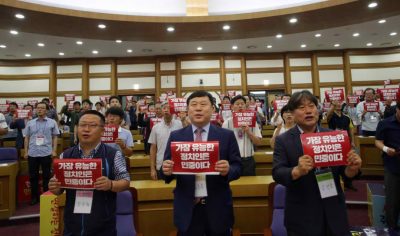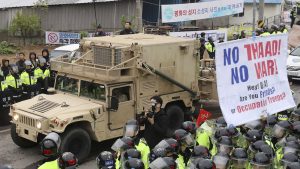South Korea’s New Progressive ‘Candlelight Revolution’ Party
Interview, Part 2

Part II of a two part interview
Zoom in Korea asked Kim Jong-hoon–an independent member of the South Korean National Assembly and Standing Representative of the New People’s Party (tentative name)–to discuss the impetus behind the formation of a new progressive party in South Korea, as well as the role of South Korean progressives vis a vis the liberal Moon Jae-in administration and the intensifying war threats on the Korean peninsula. The following is Part 2 of the interview:
ZoominKorea: How will the New People’s Party (tentative name) coordinate/delegate its resources between electoral/parliamentary politics and mass movement-building?
Kim: The New People’s Party (tentative name) will be a party that connects the picket line and the public square with the halls of the National Assembly. Even when 1.7 million citizens raised their candles to call for systemic reforms and the elimination of corruption, not one piece of reform legislation passed in the National Assembly. Workers literally put their lives on the line to fight for their livelihoods, but it takes forever to fix the system through the legislative process to meet their needs. The New People’s Party (tentative name) aims to put an end to this.
We envision a new type of political practice — one where the voices of the picket lines come together in the public square, and the indignant spirit of the public square floods the halls of the National Assembly, i.e. a politics based on the strength of people power.
ZoominKorea: You have stressed the importance of working class people participating in direct democracy. Why is this important and what does that look like?
Kim: “Building a society that respects workers” has become a popular slogan, but the lives of workers and ordinary people have not changed qualitatively. The existing political parties spout charming pledges during campaign seasons, but we can’t sit around and wait for them to make good on their promises. That’s because they are not, by nature, parties that will serve the interests of workers and farmers. And that’s why we propose direct participation in politics in which workers, farmers, and the urban poor themselves can forge a path for a better future.
Workers, farmers, and the urban poor have the power to create a better society when they come together, so we propose to combine our strengths for political power. We are also working to introduce measures that enable direct political participation, such as people’s referendums and citizens assemblies.
ZoominKorea: What will be the party’s relationship to organized labor? How will the party forge a “strategic alliance” with labor?
Kim: Strategic alliance means the party and organized labor work together based on a shared plan that will mutually strengthen the capacity of both the party and the union. In the past, the party’s practice was to go to the union and say, “Please help us in the next election,” or “Please join our party,” or “Please pay your dues.” We need to do away with this ‘politics by proxy’ and stop turning to unions solely for cash and headcounts. Our party will work side by side with organized labor, especially in times of hardship, to strengthen the capacity of unions
In the past, mass organizations were expected to pledge exclusive support to the party. We aim to create a party that provides exclusive support to mass organizations. If we can build mutual trust and strengthen our organizations in this way, that will become the source power for the party, i.e. our collective political power. Our goal is to hear people say, “Thanks to the party, the labor movement is stronger.” In our party, there are many capable organizers and people who have devoted themselves to serving the people for decades. If we all demonstrate our abilities to the fullest, I’m sure we can create a strategic and mutually-beneficial alliance between the party and organized labor.
ZoominKorea: What will be the party’s relationship with other progressive parties?
Kim: The New People’s Party (tentative name) aims to achieve victory for the people through the grand unity of all progressive forces. The preparatory committee regards serving the interests of the people as its highest guiding principle, and its formation is the first step toward creating a bigger and stronger unified force with all political forces that seek to unite. To this end, we have proposed the formation of a grand unified party with the People’s United Party, as well as the Justice Party and the Labor Party. Unfortunately, the newly-elected leadership of the Justice Party has said although it will work with the new progressive party around specific policy initiatives, it will not consider unifying with other parties in a grand alliance. We will work together with all forces that agree on the need for the grand unity of all progressive forces to launch the new progressive party before the end of September.
ZoominKorea: Reactionary forces were quick to respond to the formation of the new party by characterizing it as a revival of the outlawed Unified Progressive Party. How will the new party defend against political repression/reactionary attacks?
Kim: Progressives in South Korea are perhaps fated to be condemned as ‘pro-North’ or as ‘communist sympathizers.’ That’s because of the continued presence of the reactionary forces that parasitically thrive off of the system of national division. They only talk of ‘national security.’ No matter how outstanding our politics and practice, we will always be branded and attacked as ‘pro-North’ forces as long as we fail to resolve the division of the Korean peninsula. That’s why we will concentrate our forces to resolve the problem of national division, which is fundamental to the major problems of our society. Eradicating the deep-rooted ills that stem from national division is critical to the class struggle in South Korea and efforts to improve the lives of workers and ordinary people.
ZoominKorea: How do you foresee the party supporting the struggle against the THAAD deployment?
Kim: The THAAD deployment issue boils down to a question of how we will create a peace system on the Korean peninsula. Conducting a proper environmental impact assessment and calculating the economic costs China’s retaliation are important, but they are not the fundamental issue. If the Moon Jae-in government participates in U.S. sanctions against North Korea and maintains South Korea’s subservience to the United States, it cannot ultimately reverse the THAAD deployment. The Moon administration needs to have faith in the people, correctly assess the changing geo-political conditions on the Korean peninsula, and work to create a new order in Northeast Asia.
By standing resolutely in solidarity with the Seongju residents for the past year, we have gained their trust. The Seongju/Gimcheon residents and the Won Buddhists have emerged strong as the main driving force in this fight. The South Korean people who raised their candles to oust Park Geun-hye demand peace on the Korean peninsula and oppose the THAAD deployment. We will continue to fight alongside the people to make sure the candles that burned for Park’s impeachment will reignite as flames for sovereignty.
ZoominKorea: What role does this new progressive party play in the movement for peace and reunification moving forward?
Kim: The Trump administration has abandoned Obama’s ‘strategic patience’ and has introduced a new North Korea policy called ‘maximum press and engagement.’ This is apparently a strategy to use through threats and pressure to coerce North Korea to negotiate for denuclearization — which is not much different from the policy of the previous administration.
In order to resolve the U.S.-North Korea crisis, one must first recognize North Korea as a partner for dialogue. It’s contradictory to say it wants to talk with North Korea while at the same time pursuing a policy of hostility. Genuine talks to normalize U.S.-North Korea relations will only be possible through a simultaneous freeze of the U.S.-South Korean war games and the North Korean nuclear and missiles tests.
In terms of North-South relations, the interests of the Korean people should be the primary determinant, and we need to restore trust and prepare for unification. The Moon administration needs to make the practical choice and the resolute decision to pave the way for national unity and co-prosperity. The New People’s Party (tentative name) will devote our resources to realizing a Peace Treaty on the Korean peninsula and self-reliant reunification.
ZoominKorea: The Trump administration has said it wants to renegotiate the Korea-US Free Trade Agreement (FTA). As a member of the Trade, Industry and Energy Committee of the National Assembly, what is your view of the FTA and the proposal for renegotiation?
Kim: The standard for assessing the Korea-U.S. FTA needs to be whether or not it helped the country to improve the lives of ordinary people and overcome class polarization. What beneficial impact the Korea-U.S. FTA has had on the lives of people is a big question mark. But the South Korean government is not producing an accurate assessment of the impact of the FTA.
As a standing committee member of the Trade, Industry and Energy Committee of the National Assembly, I have repeatedly requested the government conduct an accurate impact assessment of the Korea-U.S. FTA. The government points to the increase in trade and surplus in the trade balance, as well as the U.S.’ eagerness to renegotiate, to paint the Korea-U.S. FTA as a successful agreement, but this is a very shallow assessment.
During his election campaign, Trump pledged to scrap or renegotiate free trade agreements. The Trans-Pacific Partnership (TPP) has already been scrapped, and the United States wants to renegotiate the North American Free Trade Agreement (NAFTA). It is in this context that Trump is talking about re-negotiating the Korea-U.S. FTA. South Korea needs to respond assertively and confidently to the U.S. proposal for renegotiation. As a matter of priority, we need to abolish toxic provisions, such as the investor-state dispute (ISD) clause. Most importantly, we need to begin at once the project of meticulously examining the impact of the Korea-U.S. FTA on the lives of ordinary people. If the findings reveal that the Korea-US FTA does not help the lives of ordinary people and only exacerbates class polarization, we need to be bold and be willing to reconsider the FTA in its entirety. We must not regard the Korea-U.S. FTA as an object of idol worship.
This article was originally published by Zoom in Korea.
Featured image is from Zoom in Korea.


